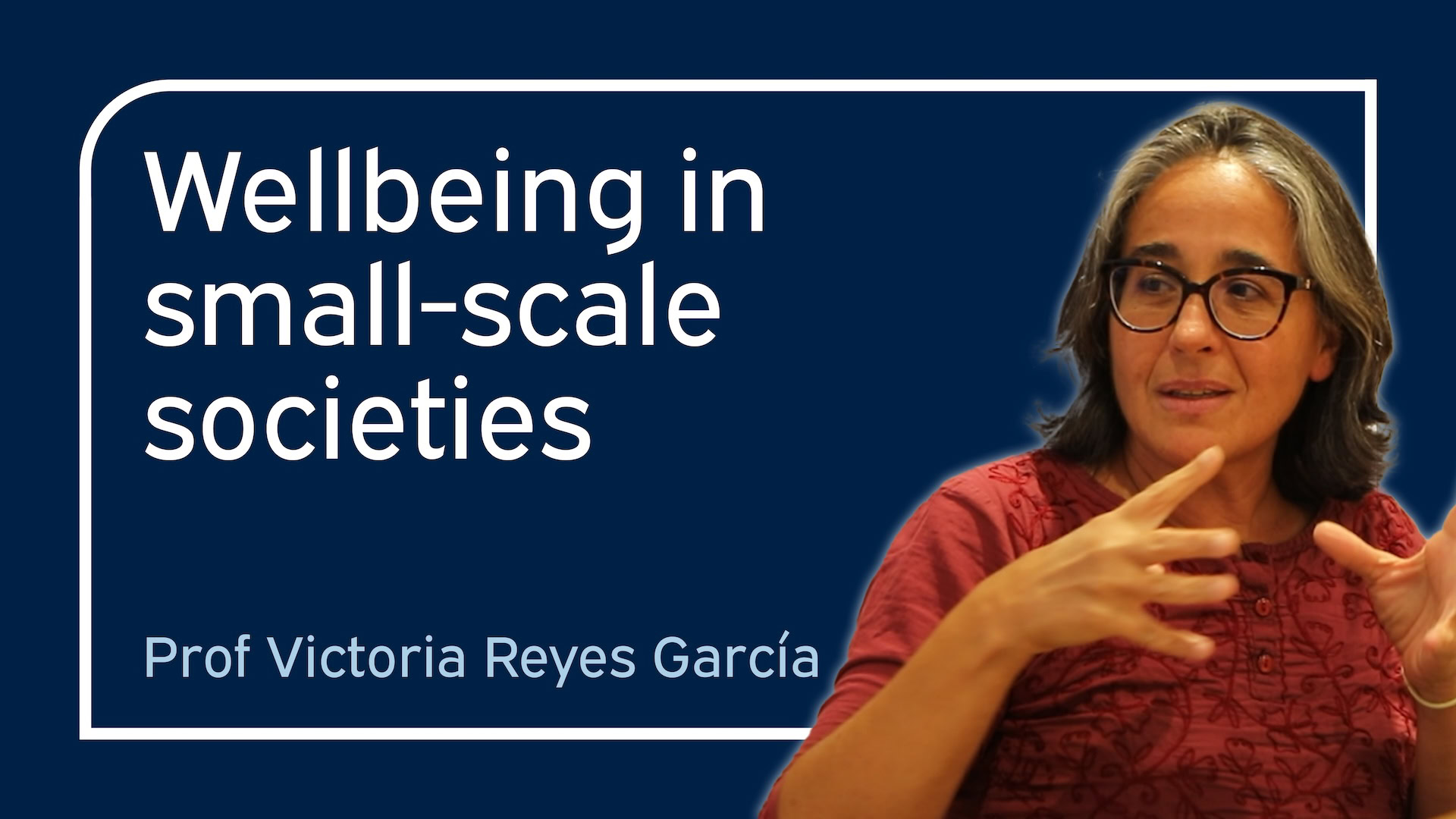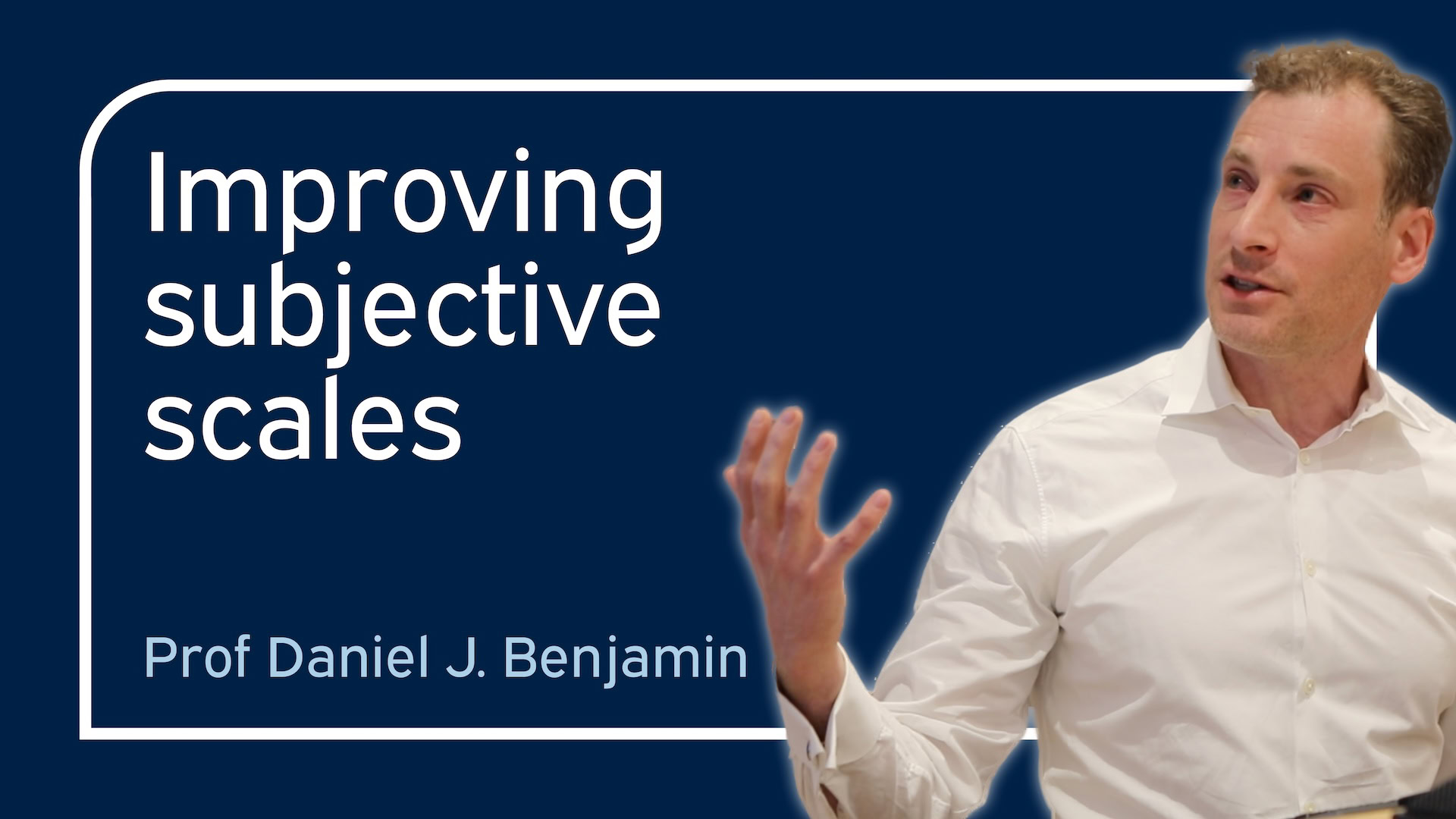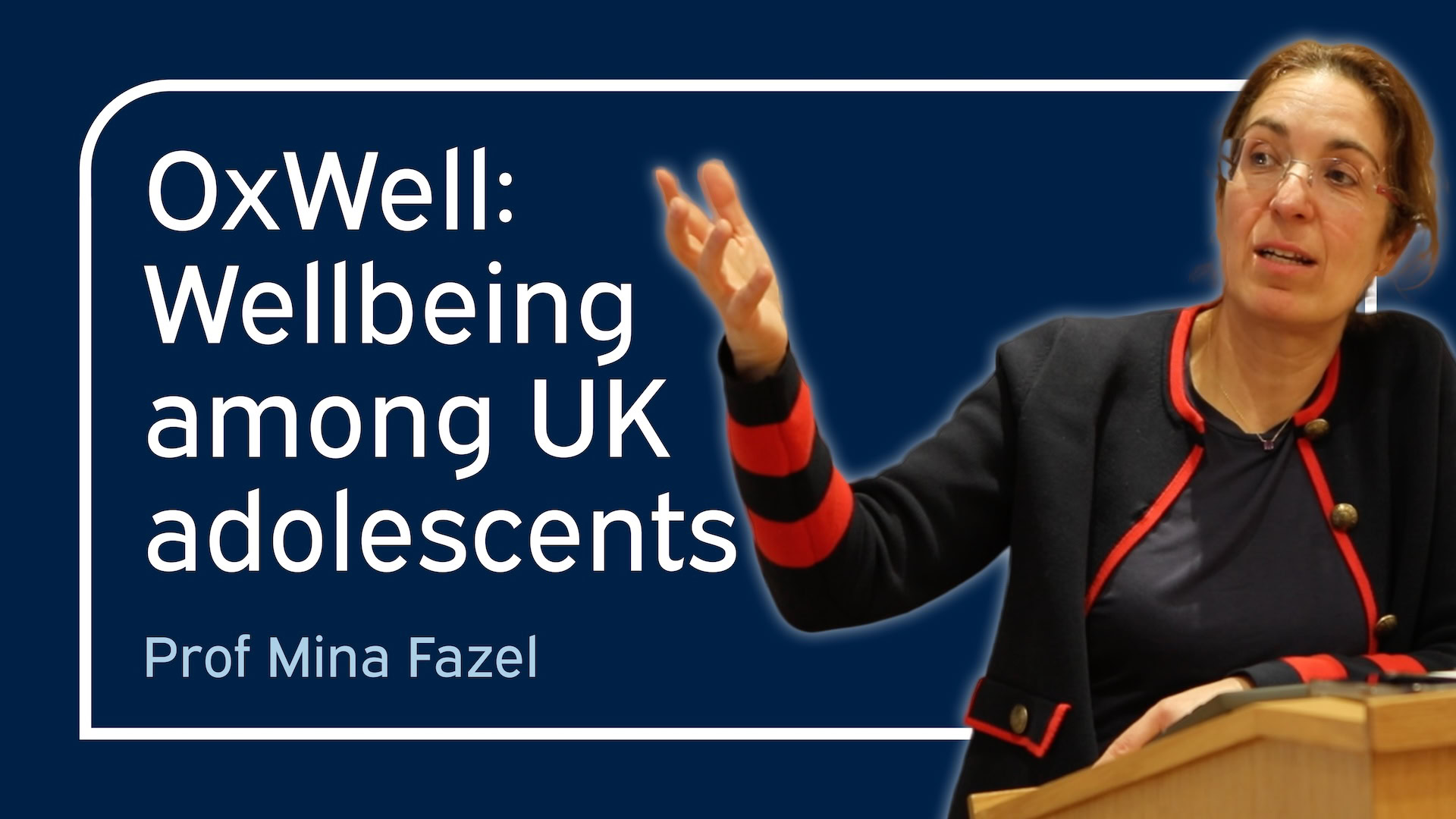Viewing archives for Centre News
Oxford MBA students explore the science behind wellbeing in a pioneering new elective
The impact of employee volunteering
Dr Florencio Portocarrero (LSE) presented findings from a field experiment on employee volunteering at the latest of the Wellbeing Research Centre’s Seminar Series.
He examined the knock-on effects of an employee volunteering intervention on both levels of wellbeing as well as other indicators of company performance, including levels of employee engagement and retention.
Watch the full presentation on the Centre’s YouTube channel.
Wellbeing in small-scale societies
Prof Victoria Reyes García (Catalan Institution for Research and Advanced Studies) shared findings on subjective wellbeing among small-scale societies at the latest of the Wellbeing Research Centre’s Seminar Series.
Her work examines the levels of, and factors to support, life satisfaction and other measures of subjective wellbeing among indigenous peoples and local communities across 19 globally distributed sites.
Watch the full presentation on the Centre’s YouTube channel.
Improving subjective scales
Prof Daniel J. Benjamin (UCLA) shared findings on techniques to improve subjective scales at the latest of the Wellbeing Research Centre’s Seminar Series.
His work, presented under the title ‘Adjusting for Scale-Use Heterogeneity on Subjective Scales’, tests multiple techniques on fine-tuning the validity and reliability of subjective scales, such as those used to measure wellbeing.
Watch the full presentation on the Centre’s YouTube channel.
Wellbeing Research Centre welcomes leading sustainable wellbeing scholars
In partnership with Reapra, the Wellbeing Research Centre at the University of Oxford has welcomed a pair of world-class researchers to spearhead its emerging research stream in sustainable wellbeing.
Paul Behrens (Reapra Senior Research Fellow) and Annegeke Jansen (Reapra Research Associate) join the Centre’s team of interdisciplinary researchers to examine long-term questions around human wellbeing and environmental sustainability.
Their appointments are supported by Asia-based venture builder and investment group Reapra, whose mission is to co-create industries for the betterment of society through research and practice.
Paul Behrens is the British Academy Global Professor at the Oxford Martin School, whose research focuses on the environmental and social impacts of large-scale food system transformation. He is also the author of the popular science book, The Best of Times, The Worst of Times: Futures from the Frontiers of Climate Science (Indigo Press, 2021) and winner of the inaugural Frontiers Planet Prize.
Annegeke Jansen is currently a PhD candidate at Leiden University, focusing on the measurement of sustainable and inclusive wellbeing as part of the WISE Horizons project. In addition, she investigates determinants and historical developments related to wellbeing.
The pair have previously collaborated on major contributions to the Beyond GDP movement, published in The Lancet Planetary Health and Nature Scientific Data.
“It is critical to turn our attention to the notion of sustainable wellbeing.”
Paul Behrens, Reapra Senior Research Fellow, said: “I’m delighted to be collaborating at the critical intersection of human wellbeing and environmental sustainability. It is essential that we work towards improving wellbeing while both reducing our environmental impacts and dealing with environmental damage. Interdisciplinary collaboration with the Centre’s diverse, world-leading team is incredibly exciting.”
Annegeke Jansen, Reapra Research Associate, said: “I’m excited to join the Wellbeing Research Centre to explore the deep connections between human wellbeing and environmental sustainability. In a world facing ecological breakdown and growing inequalities, it’s crucial to rethink what truly supports flourishing lives—now and in the future. I look forward to working with the Centre’s interdisciplinary team and learning from their renowned expertise in wellbeing research.”
Jan-Emmanuel De Neve, Professor of Economics and Behavioural Science at Saïd Business School, Oxford, and Director of the Wellbeing Research Centre, said: “With the appointment of Paul and Annegeke we gain the expertise of two leading scholars who are building bridges between the academic fields focussed on sustainability and subjective wellbeing. If our aim is to advance the wellbeing of current and future generations then it is critical to turn our attention to the notion of sustainable wellbeing.
“We are tremendously grateful to our like-minded colleagues at Reapra who have made these fellowships possible and we look forward to our partnership generating tangible insights that will hopefully underpin policy action in due course.”
Laura Lynn Lee, Growth & Wellbeing Catalyst at Reapra, said: “This is indeed an exciting time for Reapra as we welcome Paul and Annegeke to our research and practice community. We look forward to learning together with them and Jan’s team at the Wellbeing Research Centre as we co-create Reapra’s vision of long-term wellbeing for the next generation.”
Why Workplace Wellbeing Matters published by HBR Press
World Happiness Report 2025: People are much kinder than we expect, research shows
Belief in the kindness of others is much more closely tied to happiness than previously thought, according to findings published today (20 March) in World Happiness Report 2025.
Global evidence on the perceived and actual return of lost wallets shows that people are much too pessimistic about the kindness of their communities compared to reality. Actual rates of wallet return are around twice as high as people expect.
Believing that others are willing to return your lost wallet is also shown to be a strong predictor of population happiness: Nordic nations once again top the ranking of the world’s happiest countries, but they also rank among the top places for expected and actual return of lost wallets.
The findings are published today to mark the UN’s International Day of Happiness. They are powered by Gallup World Poll data and other sources, including the Lloyd’s Register Foundation World Risk Poll, and analysed by leading experts in wellbeing science.
Further results published in this 13th edition of the World Happiness Report, focused on the theme of “caring and sharing”, include:
- Sharing meals with others is strongly linked with wellbeing across all global regions, but the number of people dining alone in the United States has increased 53% over the past two decades.
- Household size is closely linked to happiness. Four to five people living together enjoy the highest levels of happiness in Mexico and Europe, but many people in Europe are living on their own.
- In 2023, 19% of young adults across the world reported having no one they could count on for social support. This is a 39% increase compared to 2006.
- Deaths of despair are less frequent in countries where benevolent acts are more frequent.
- Declining happiness and social trust in the US and parts of Europe combine to explain the rise and direction of political polarisation and anti-system votes.
- The cost-effectiveness of charities varies dramatically. Some charities are hundreds of times better at increasing happiness per dollar than others.
World Happiness Report 2025 also contains a ranking of the world’s happiest countries. Finland leads the world in happiness for the eighth year in a row, with Finns reporting an average score of 7.736 (out of 10) when asked to evaluate their lives.
Costa Rica (6th) and Mexico (10th) both enter the top 10 for the first time, while continued upward trends for countries such as Lithuania (16th), Slovenia (19th) and Czechia (20th) underline the convergence of happiness levels between Eastern, Central and Western Europe.
The United States (24th) falls to its lowest-ever position, with the United Kingdom (23rd) reporting its lowest average life evaluation since the 2017 report.
Country rankings are based on a three-year average of each population’s average assessment of their quality of life. Interdisciplinary experts from economics, psychology, sociology and beyond then seek to explain the variations across countries and over time using factors such as GDP per capita, healthy life expectancy, having someone to count on, a sense of freedom, generosity and perceptions of corruption.
These factors help to explain the differences across nations, while the rankings themselves are based solely on the answers people give when asked to rate their own lives.
Lara B. Aknin, professor of social psychology at Simon Fraser University, and an editor of the World Happiness Report, said: “Human happiness is driven by our relationships with others. Investing in positive social connections and engaging in benevolent actions are both matched by greater happiness.”
John F. Helliwell, an economist at the University of British Columbia, a founding editor of the World Happiness Report, and a long-time lost wallet researcher, said: “The wallet data are so convincing because they confirm that people are much happier living where they think people care about each other. The wallet dropping experiments confirm the reality of these perceptions, even if they are everywhere too pessimistic.”
Jon Clifton, CEO of Gallup, said: “Happiness isn’t just about wealth or growth — it’s about trust, connection and knowing people have your back. This year’s report proves we underestimate how kind the world really is. If we want stronger communities and economies, we must invest in what truly matters: each other.”
Jan-Emmanuel De Neve, director of Oxford’s Wellbeing Research Centre, professor of economics at the University of Oxford, and an editor of the World Happiness Report, said: “This year’s report pushes us to look beyond traditional determinants like health and wealth. It turns out that sharing meals and trusting others are even stronger predictors of wellbeing than expected. In this era of social isolation and political polarisation we need to find ways to bring people around the table again — doing so is critical for our individual and collective wellbeing.”
Jeffrey D. Sachs, President of the UN Sustainable Development Solutions Network, Director of the Center for Sustainable Development at Columbia University and a founding editor of the World Happiness Report, said: “The findings in this year’s World Happiness Report reconfirm a fundamental truth: happiness is rooted in trust, kindness, and social connection. It is up to us as virtuous individuals and citizens to translate this vital truth into positive action, thereby fostering peace, civility, and wellbeing in communities worldwide.”
The World Happiness Report is published by the Wellbeing Research Centre at the University of Oxford, in partnership with Gallup, the UN Sustainable Development Solutions Network and an independent editorial board.
The editorial board consists of John F. Helliwell (University of British Columbia), Richard Layard (London School of Economics and Political Science), Jeffrey D. Sachs (Columbia University), Jan-Emmanuel De Neve (University of Oxford), Lara B. Aknin (Simon Fraser University), and Shun Wang (Xi’an Jiaotong-Liverpool University).
Read the report in full at worldhappiness.report.
Researchers share initial findings from landmark happiness study
- In its next phase, the Health and Happiness Study aims to collect wellbeing data from over 10,000 global participants using surveys, smartphones, and wearable devices.
Researchers at Harvard and Oxford universities today (Saturday) announced early results from the Health and Happiness Study – the first large-scale study of its kind, which seeks to identify predictors of happiness and wellbeing using data from smartphones and Garmin smartwatches.
The pilot study, primarily comprised of Garmin associates in North America and Europe, revealed several statistically significant findings. And while initial results need to be corroborated through the larger global study, they illustrated an important relationship between sleep, exercise and happiness.
Key findings include:
- Participants consistently report more frequent positive emotions than negative emotions, suggesting that people generally do feel more happy than unhappy on a day-to-day basis.
- Ideal times of day for happiness and wellbeing varied considerably across subjects, with some individuals showing greater signs of emotional wellbeing in the mornings, and others in the afternoon or evenings.
- Daily physical activity and adequate sleep measured by Garmin devices were strongly correlated with higher levels of happiness and lower levels of stress.
- Emotional stability varied by age, with older adults showing more stability than younger adults.
- The study demonstrated high retention rates, suggesting participants found value in self-monitoring emotions during the day.
- Respondents were happiest when involved in cultural and social activities, eating, or spending time with friends and family.
After receiving ethical approval from the Institutional Review Board (IRB), the pilot study was launched by Harvard Kennedy School of Government and Harvard T.H. Chan School of Public Health researchers – in collaboration with the Wellbeing Research Centre at the University of Oxford, the University of Warwick, the University of Saskatchewan, Avicenna and Garmin – at the Lugano Happiness Forum in Switzerland on June 18, 2024.
Now, after successfully completing two initial pilot studies, the Health and Happiness Study is expanding to include more than 10,000 participants from across the globe.
Micah Kaats, the Principal Investigator for the study and affiliated with both Harvard and Oxford universities, said: “By leveraging large-scale data from smartphones, smartwatches, and surveys collected from a global sample population, we aim to uncover new insights into the drivers and determinants of health and happiness for people around the world.”
Surveys are sent to respondents’ smartphones three times per day, asking them about their moods, emotions, and activities directly preceding the survey. Those reports are then cross-referenced with data from Garmin wearables and smartphones to provide a nuanced, qualitative and quantitative representation of how wellbeing impacted by variables like physical activity, sleep, socialization and stress.
Susan Lyman, Garmin Vice President of Consumer Sales and Marketing, added: “As a collaborator on more than 1,000 research studies and clinical trials, the Garmin Health team is honored to work with academic researchers at Harvard and Oxford University on this groundbreaking study to better understand the intersection of happiness and health.”
The Health and Happiness Study is currently accepting applicants to participate in the global study. Participants can learn more and sign up on the study website: www.healthandhappinessstudy.com.
While preferable, participants do not need a Garmin smartwatch to join the study. All participants who join will be eligible to receive free Garmin products and discounts, as well as individualised wellbeing reports that provide detailed insights into their own personal health and happiness.
OxWell: Wellbeing among UK adolescents
Prof Mina Fazel (Oxford) shared findings from a national cross-sectional study on child and adolescent wellbeing at the latest of the Wellbeing Research Centre’s Seminar Series.
The OxWell study assesses multiple measures of childhood and adolescence, across multiple local authorities in the UK. Prof Fazel focused in particular on findings related to friendship and school belonging – factors she describes as “low-hanging fruit” for improving wellbeing among the youth population.
Watch the full presentation on the Centre’s YouTube channel.
Mind the Gap: Research identifies worrying wellbeing disparities between men and women on a global scale
- Relative to men, women’s wellbeing has been declining globally.
- Researchers reviewed two decades of global data, long-run trends since the 1970s, and existing analyses.
- Study further reveals vast differences in the size of this gender wellbeing gap between countries.
Women’s wellbeing relative to men has declined in the past two decades despite substantial social and economic progress, newly-published research shows.
Researchers from the Wellbeing Research Centre at the University of Oxford, Warwick Business School, and Leeds University Business School studied trends of wellbeing and health outcomes using global data for the period 2006 to 2023, and reviewed existing research on the so-called ‘gender wellbeing gap’.
The findings are published today (Wednesday) in a special women’s health edition of the journal Science Advances, and challenge long-held assumptions about women’s wellbeing on a global scale.
While women, on average, report higher levels of life satisfaction and overall happiness than men, women experience worse outcomes in both mental health and reports of negative ‘affect’, or negative emotions.
This trend, which has been described as a paradox, has widened over the same period – meaning women’s wellbeing, particularly in the affective domain, has dropped relative to men.
But while there is clear evidence of a relative decline in women’s wellbeing on a global scale, the findings show vast differences in the size of the gender wellbeing gap across different countries.
In addition to two decades of global data, the research team also looked at long-run trends in Europe and the USA since the 1970s, and reviewed existing literature in search of explanations for the relative decline in women’s wellbeing.
Their findings underscore the need for broader-reaching gender-sensitive policies in order to reduce and subsequently eliminate the observed gender wellbeing gaps, and further research into gender disparities between reported life satisfaction, and both positive and negative emotions.
“This seems puzzling and paradoxical.”
Dr Caspar Kaiser, Assistant Professor in the Behavioural Science Group at Warwick Business School, Research Fellow at the Wellbeing Research Centre, and co-lead author of the paper, said: “In my view, the most striking finding – both in the literature and in our own analyses – is that despite global improvements in women’s economic standing, gender gaps in wellbeing have not trended in the same direction. To the contrary: for several indicators, and on a global scale, women now fare worse relative to men than twenty years ago. This seems puzzling and paradoxical.”
Dr Naomi Muggleton, Assistant Professor in the Behavioural Science Group at Warwick Business School, and co-lead author of the paper, said: “Purely biological accounts would predict consistent patterns globally. But our findings suggest that cultural norms, societal expectations, and economic conditions play key roles in shaping the paradoxes we observe in women’s wellbeing. These factors vary widely across regions, influencing both the pressures women face and the resources available to them, which helps explain why the patterns differ so much between countries.”
“Understanding these factors is essential for designing effective, gender-responsive policies.”
Dr Edika Quispe-Torreblanca, Associate Professor of Behavioral Decision Making in the Centre for Decision Research at the University of Leeds Business School, and co-lead author of the paper, said: “Wellbeing is a complex concept, and men and women may prioritize different aspects when assessing their subjective wellbeing, making direct comparisons challenging. Our review highlights that, while some research has begun to explore these differences, much remains to be done.
“Recognising these distinctions is crucial for policymakers. For instance, if men and women differ in how they balance present and future wellbeing, policies should reflect this. Measures that address immediate concerns like childcare and healthcare may impact wellbeing differently than those focused on long-term stability, such as financial security and career growth.
“Likewise, if men and women experience wellbeing differently in relation to work, family, or community engagement, policies should take these differences into account when designing workplace flexibility, caregiving support, and community-based programs. Understanding these factors is essential for designing effective, gender-responsive policies.”
‘Two Paradoxes in Women’s Wellbeing’ is published in Science Advances.




